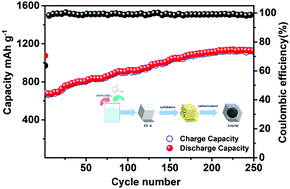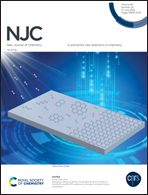MOF-derived ZnS/NC yolk–shell composites for highly reversible lithium storage†
Abstract
The application of ZnS-based anode materials in lithium-ion batteries (LIBs) has some severe challenges, such as the insulating nature of ZnS, the pronounced polarization caused by conversion reactions and alloying reactions, and the volume expansion during the charging–discharging process, which limits the electrochemical activity of the material. Here, we design and synthesize yolk–shell structured ZnS/NC dodecahedra via successive sulfurization and carbonization of zeolitic imidazolate MOFs. When used as an anode material for LIBs, the obtained ZnS/NC electrodes exhibit an excellent discharge capacity of 1130 mA h g−1 after 250 cycles at 100 mA g−1 with a coulombic efficiency higher than 99%, and have a good cycling stability of ∼420 mA h g−1 after 500 cycles at 1 A g−1. Benefiting from the synergistic effect of the ZnS nanocrystallites, nitrogen-doped carbon, and unique yolk–shell structure, ZnS/CN exhibits excellent performance, providing a promising prospect for ZnS-based composites to be applied in LIBs.



 Please wait while we load your content...
Please wait while we load your content...